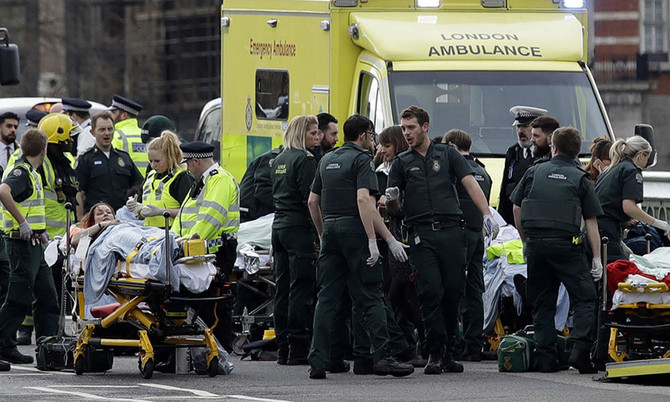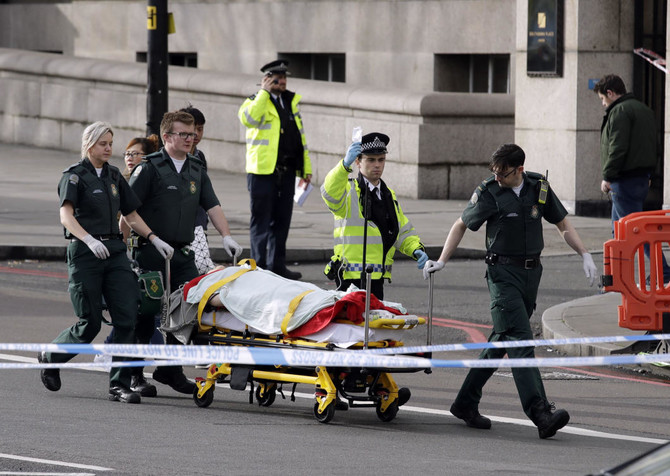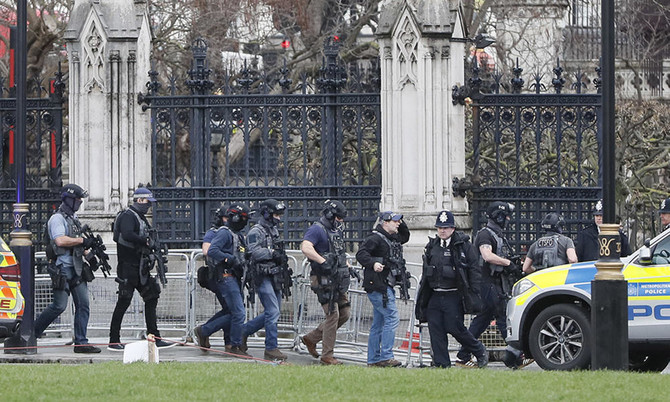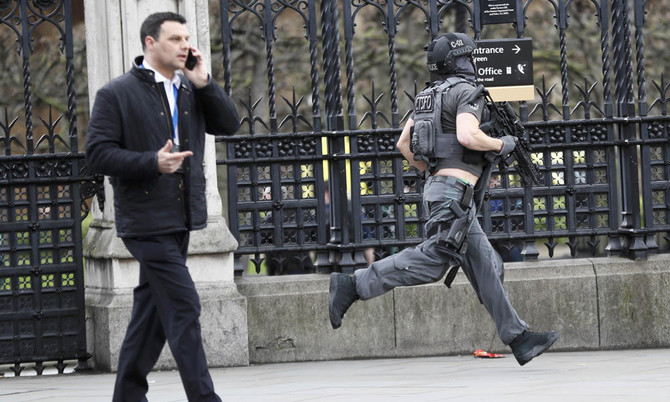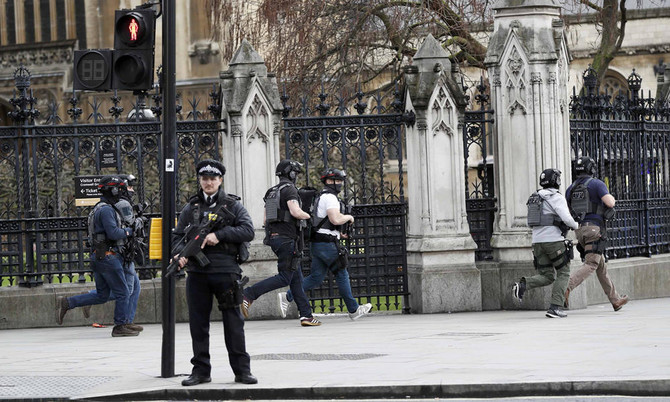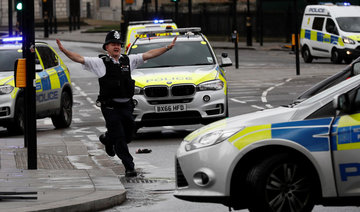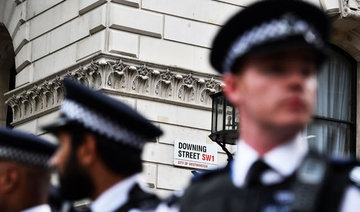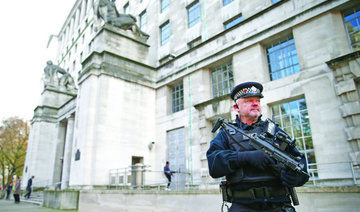LONDON: Four people were killed and at least 20 injured in London on Wednesday after an attacker stabbed a policeman and a car plowed into pedestrians close to the British parliament, in what police called a terrorist incident.
The dead included the assailant and the policeman he stabbed, while the other two victims were among the pedestrians hit by the car as it tore along Westminster Bridge, which is right next to parliament.
“We’ve declared this as a terrorist incident and the counter-terrorism command are carrying out a full-scale investigation into the events today,” Mark Rowley, Britain’s most senior counter-terrorism officer, told reporters.
“The attack started when a car was driven over Westminster Bridge, hitting and injuring a number of members of the public, also including three police officers on their way back from a commendation ceremony.
“A car then crashed near to parliament and at least one man, armed with a knife continued the attack and tried to enter parliament.”
Witnesses who were inside parliament at the time heard loud bangs and shortly afterwards saw the knifeman and the stabbed policeman lying on the ground in a courtyard just outside, within the gated perimeter of the parliamentary estate.
Chris Doyle, director of the Council for Arab-British Understanding (Caabu), was inside the parliament building's Central Lobby on Wednesday afternoon when the incident happened.
He said that the parliament building was on lockdown and that there were "several hundred" people inside.
An announcement by officials said that there was a suspect vehicle outside the parliament that it was being dealt with by bomb squad units, Doyle said.
"It's calm now but there was panic earlier," Doyle told Arab News at 4 p.m. local time.
He said that a mass of people were trapped inside the building.
"Armed police are everywhere milling amongst politicians, the public and schoolchildren," he said.
Muddassar Ahmed, managing partner at Unitas Communications Ltd., and also an Arab News columnist, said he too was on lockdown inside the parliament building.
He was visiting an MP’s office in the building. After the alert was raised they were asked to evacuate the office but then told to return.
Police were carrying out “a door-to-door search” of the building, Ahmed told Arab News.
He said he was feeling “shaken” after about an hour on lockdown, with armed police still moving through the parliament building.
A Reuters photographer said he saw at least a dozen people injured on the bridge. His photographs showed people lying on the ground, some of them bleeding heavily and one under a bus.
A woman was pulled alive, but with serious injuries, from the Thames, the Port of London Authority said. The circumstances of her fall into the river were unclear.
Three French schoolchildren aged 15 or 16 were among those injured in the attack, French officials said.
The attack took place on the first anniversary of attacks by Islamist militants that killed 32 people in Brussels.
Bridge incident
On the bridge, witnesses said a vehicle struck several people, and photos showed a car plowed into railings.
The former Polish foreign minister Radoslaw Sikorski posted a video on Twitter that showed people lying injured on the bridge.
Sikorski, a senior fellow at Harvard Center for European Studies, says he saw at least five people lying on the ground after being “mown down” by a car.
The scene unfolded within clear sight of the London Eye, a large ferris wheel with viewing pods with views of the capital. Footage showed the pods full as viewers watched police and medical crews on the bridge.
The city was also on alert for the Thursday funeral of Martin McGuinness, former IRA commander.
The threat level for international terrorism in the UK was listed at severe. The city was also on alert for the Thursday funeral of Martin McGuinness, former IRA commander.
Parliament session suspended
“I just saw a car go out of control and just go into pedestrians on the bridge,” eyewitness Bernadette Kerrigan told Sky News. She was on a tour bus on the bridge at the time.
“As we were going across the bridge, we saw people lying on the floor, they were obviously injured. I saw about 10 people maybe. And then the emergency services started to arrive. Everyone was just running everywhere.”
The House of Commons, which was in session at the time, was immediately suspended and lawmakers were asked to stay inside.
Prime Minister Theresa May was safe after the incident, a spokesman for her office said. He declined to say where May was when the attack took place.
Journalist Quentin Letts of the Daily Mail newspaper told LBC radio that he had witnessed the stabbing of the policeman and the shooting of the assailant from his office in the parliament building.
“He (the assailant) ran in through the open gates ... He set about one of the policemen with what looked like a stick,” Letts said.
“The policeman fell over on the ground and it was quite horrible to watch and then having done that, he disengaged and ran toward the House of Commons entrance used by MPs (members of parliament) and got about 20 yards or so when two plain-clothed guys with guns shot him.”
Britain is on its second-highest alert level of “severe” meaning an attack by militants is considered highly likely.
In May 2013, two British Islamists stabbed to death soldier Lee Rigby on a street in southeast London.
In July 2005, four British Islamists killed 52 commuters and themselves in suicide bombings on the British capital’s transport system in what was London’s worst peacetime attack. (With Reuters)


